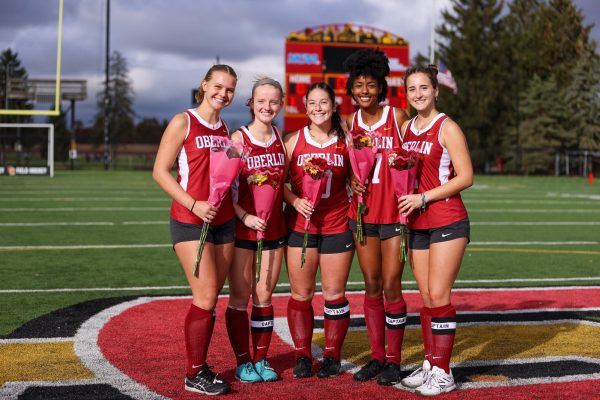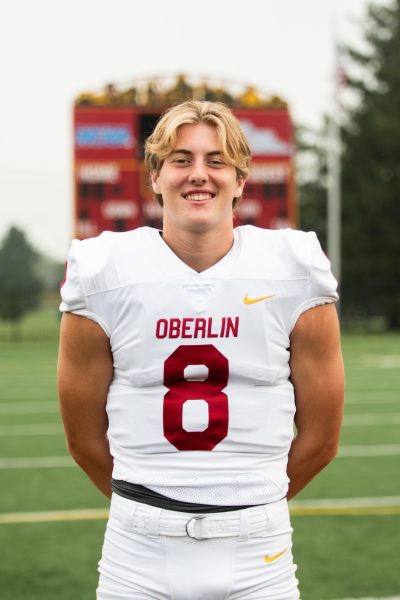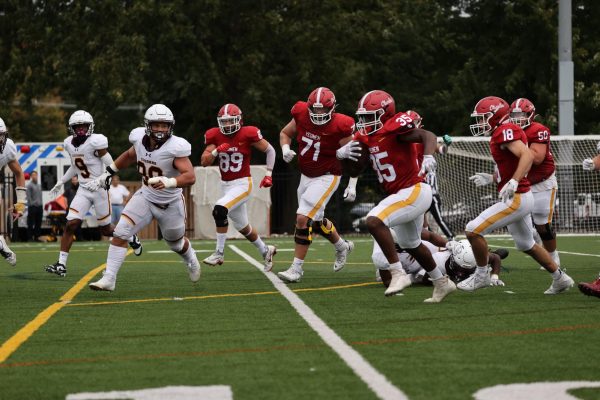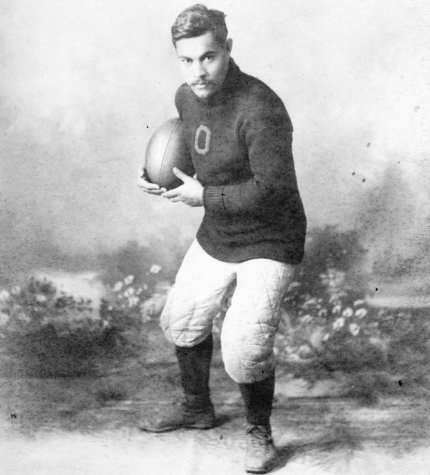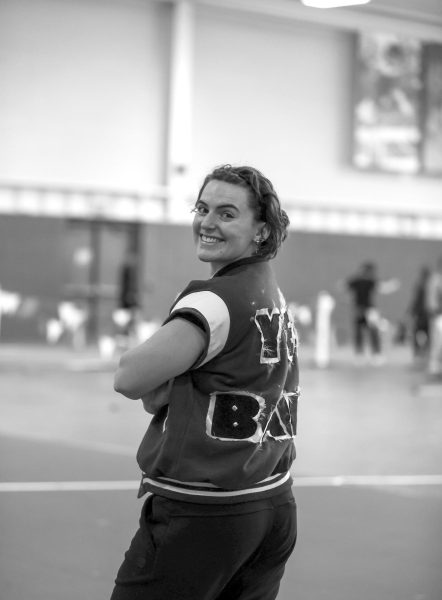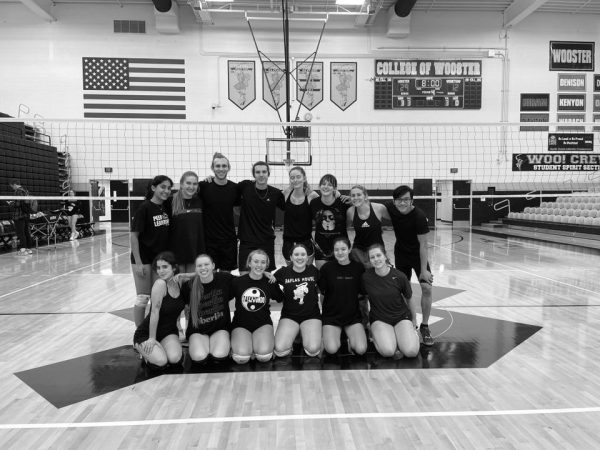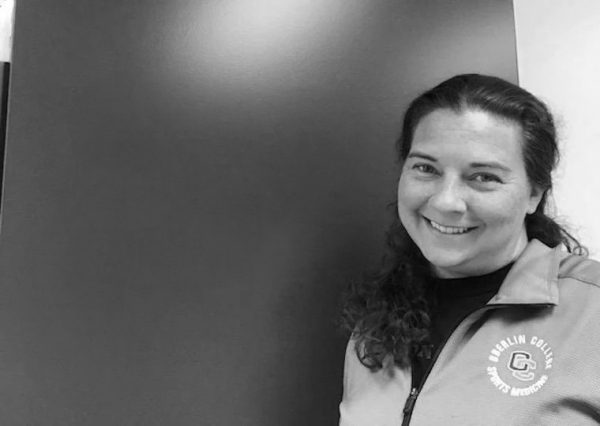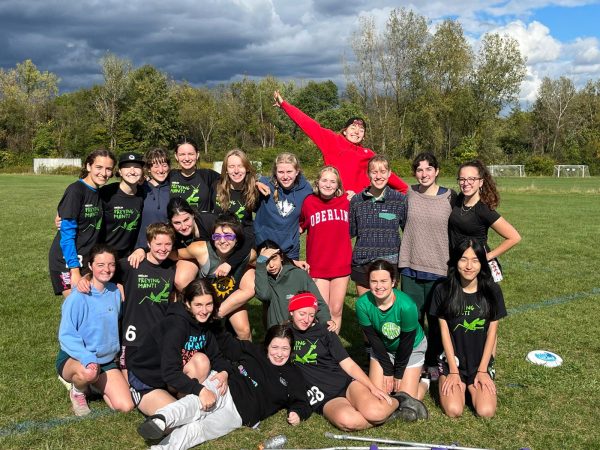Cornerbacks Coach and Director of Football Operations Alex Hanna
Coach Alex Hanna did not have a traditional path to her coaching career. Before coming to Oberlin, she worked for the Cleveland Browns in various capacities and assisted with organizing 20 youth football camps and clinics. She also coached high schoolers at Mentor High School, where her players received offers from some of the top football programs in the nation. She has been outspoken about the treatment of female coaches and recently wrote a piece on TheUnsealed.com titled “This Is What I Hope You Learn From A Female Football Coach,” where she discusses her experiences navigating a male-dominated field. In addition to her work as an Oberlin College football coach, she is also a resident liaison in Baldwin Cottage and is invested in community service.
How did you become interested in coaching?
I was competitive when I was younger. I competitively danced for about 12 years. But once I got to high school, dancing wasn’t something that interested me as much. I found crew rowing and became super involved in that, and tried out a couple of other sports along the way. I tried lacrosse and played field hockey for a couple of years. I thought I was going to go to college for crew, but it didn’t end up working out that way. So I decided that I needed to find another sport that interested me and had that competitive atmosphere; football became my sport.
What are some of the challenges and opportunities of coaching during COVID-19?
One challenge is interpersonal relationship-building. One of the reasons why I love football so much is because of the relationships you develop with players, coaches, and other people in your league and conference. It was difficult to join something when I wasn’t physically present and having to develop things for myself and then reiterate them to my players from a computer screen.
But through this, we’ve learned many unique ways that we can teach and make the experience of learning a playbook, learning who you are in the community, and learning who you are as a human being more effective. You can always pick up a Zoom call and talk to someone at any time, which is something that you can’t always do in-person.
Zoom has definitely helped us out from a recruiting standpoint as well. I can’t be in California right now, but I can be on someone’s computer who’s in California. So I think it’s still going to help us move forward — even when things are allowed to be in person, Zoom will still be our first resource.
Could you talk about your experience coaching for the Cleveland Browns in their community relations and youth football program?
I actually started with the Cleveland Browns in sales. I knew I wanted to be in football after graduating from college, and I had previously coached at Mentor High School. I wanted to see if there was something else I could try out and stay in sports, but with me not necessarily being on the field.
It was a learning experience for me because I realized that while I loved everyone I worked with and the culture of the workplace, sales just wasn’t for me. But they gave me the freedom to go try out new things. So I tried out coaching their youth football programs and became heavily involved in community initiatives, which is something that is near and dear to me. I coached athletes with disabilities, seven and eight-year-olds in a recreational league, anything I could do to get involved with the Cleveland community. I got to do all of this while coaching and educating young people.
You’re part of a small number of female coaches within NCAA football. How do you navigate being in a space that is often male-dominated?
It ties to your confidence level and what you know and what you do. I am a big proponent of, “There’s no dumb question.” Regardless of your gender, every person has questions, so the next step is not being afraid to ask that question no matter who you’re surrounded by and what that person looks like. If you’re the best in your field it’s because you are an active learner and you’re consistently working to learn something new every day. Learning means asking questions and learning means listening, regardless of who’s telling you, and regardless of who you’re listening to.
I know I work around majority men, but it’s never changed the learning progression. If I ask a question, I’ll get an answer. I think everybody is willing to help as long as you’re willing to put in the effort to learn it.
You recently wrote a piece in The Unsealed about the challenges that you’ve faced as a female coach. Could you elaborate on why it was important to you?
I touch on some touchy things throughout that article — some things that have been said to me, some ways that I’ve been spoken to, some ways that I’ve been spoken about behind my back that have circled back to me, the discomfort of being in the locker room having known what’s being said, and also being put in a position of choosing between my passion and someone I care about. I think anyone can go through this, but if you’re a female in any male-dominated industry, you’ll hit this a little bit harder.
But I’ve never felt this way at Oberlin College, and it is still so refreshing and incredible. I remember telling my mom the first day that I have all of these responsibilities, and I’m being held to these responsibilities the same way that anybody else who is in my position would be held to them. It’s so comforting to know that everybody here trusts each other. And that’s one of the four pillars of this program and the culture that we’re developing, being able to trust one another.
This past summer there was a coach who didn’t believe that I was there as a recruiting coach, I remember texting our coaches group chat explaining what happened. Coach Opgenorth texted back saying, “First day of the rest of your life and you’re going to kill it.” And I knew I was; I know I am. That’s where the confidence comes into play, it’s what has never made me feel bad about working in a male-dominated industry. Because at the end of the day, we’re all human beings that are going to stumble, and we just need one person that’s willing to teach us.
Why did you choose Oberlin?
I chose the people that I had interacted with and for the larger campus community. Sometimes a campus is so divided between athletes and the rest of the campus, but Oberlin was completely different from that. Coach Opgenorth said in our first interview that Oberlin will be together as one, so understanding my role as resident liaison in Baldwin Cottage and what I do with the community and Oberlin students is just as important as what I’m doing as a coach.
What is advice you’d give to other women who want to pursue a career in coaching or sports in general?
I think this goes across the board, whether you are a female-identifying person in sports or whatever industry it is: It’s not always going to be easy, but it will absolutely be worth it as long as it’s something that you’re passionate about. I remember hearing this and it resonating with me because no one told me that I would just fly through this — if everything was easy that would be a problem. This mentality guided me where I am today, whether I’m at work at 7o’clock in the morning, or 7o’clock at night, I’m happy.
Who’s your football favorite team and player?
I was born and raised a Cleveland Browns fan — working for them was a dream come true. But at the same time it was like, “Oh no, if they lose and I go into work on Monday, I can’t talk about that Sunday night game!” But Oberlin has taken over as the new number one, obviously. I love and support Yeomen football, and I love and support this team. The coaches and players have welcomed me with open arms and [are] just all around awesome guys, and I’m so happy to be a part of this family. I don’t think there’s a better college or group of people that I could’ve ever started my true coaching career with.


